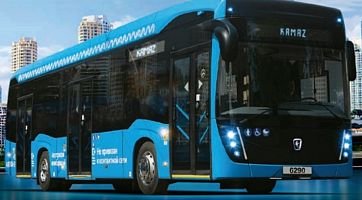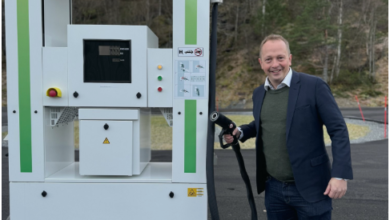Kamaz unveils hydrogen fuel cell electric bus
Kamaz is expanding its line of eco-friendly passenger transport and developed the first low-floor hydrogen-electric bus, KAMAZ-6290.

Russia’s Kamaz has recently presented the first low-floor hydrogen-electric bus Kamaz-6290, H2 Bulletin reports.
It has used its Kamaz-6282 electric bus as a base to work on design documents for the testbed hydrogen-electric.
Kamaz plans to test the prototype hydrogen-electric bus on the streets of Moscow under actual operating conditions. There is an autonomous hydrogen filling station only in Chernogolovka near Moscow, so the bus cannot be tested elsewhere. Test drives are expected to be finished in 2023.
Andrey Savinkov, Deputy Chief Designer of Kamaz, said, “Compared with an electric bus running 70 km at a full charge, a hydrogen-electric bus can travel 250 km, which makes it fit even for interurban transportation.”
Nefaz, Kamaz’s subsidiary based in Bashkortostan, has assembled the chassis and body of the hydrogen-electric bus, and the Kamaz R&D Center has mounted its roof equipment.
Operating on hydrogen fuel cells, it has six cylinders for compressed hydrogen installed on the roof for safety reasons. With a maximum speed of 80 km/h with a driving range of 250 km, it can carry 80 people. The bus can efficiently operate at ambient temperatures between -40° and +40° С.
The hydrogen power motor produces around 45 kW of power. It is equipped with a ZF electric portal axle, a powerful pneumatic braking system, EBS, ABS, ASR, EPB, a slope hold function, a driving lock if the door opens, and a brake pad wear sensor.
The body is made of high-strength steel and safe plastic, making the vehicle sturdy and wreck-resistant in road accidents. The GVW of the Kamaz-6282 hydrogen-electric bus is 19 tonnes, and the overall dimension is 12.4×2.55×3.4 m.
Andrey Savinkov added that if the government establishes the hydrogen filling infrastructure and uses the hydrogen buses, we can arrange the final assembly of hydrogen-electric buses at our Sokolniki Railway Car Repair and Construction Plant in Moscow, where we already assemble our electric buses.
